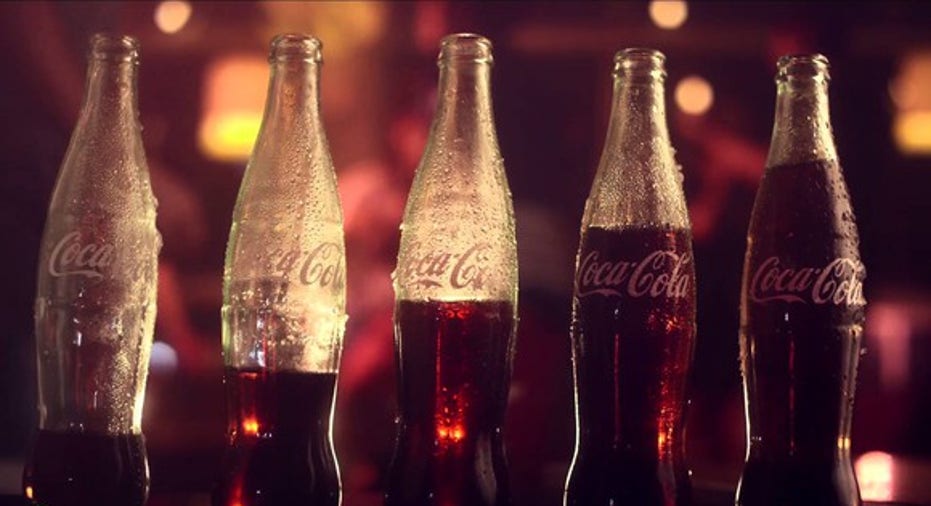Better Buy: Coca-Cola vs. Anheuser-Busch InBev

Everyone needs to drink something, and both Coca-Cola (NYSE: KO) and Anheuser-Busch InBev (NYSE: BUD) have taken different tacks toward addressing the same basic need for people to quench their thirsts. Coca-Cola offers a wide variety of beverages, ranging from its namesake carbonated cola to juices, still and sparkling water, tea, and sports drinks. Anheuser-Busch InBev, on the other hand, caters to the adult side of the spectrum, with its popular Budweiser leading a long list of beers, malt liquors, flavored malt beverages, and some nonalcoholic beverages.
Investors want industries they can count on, and given solid demand in beverages, many want to know which of these two giants is the better buy right now. With that in mind, let's look at Coca-Cola and Anheuser-Busch InBev to see how they compare on some key metrics.
Image source: Coca-Cola.
Valuation and stock performance
Neither Coca-Cola nor Anheuser-Busch InBev has given investors the kind of returns they want to see. The soft-drink giant and the beer behemoth have both lost money for their shareholders over the past year, with total returns of negative 3% each since February 2016.
Yet even though the two stocks have lost ground, they haven't become particularly attractive in terms of valuation based on simple earnings metrics. Comparing the two based on trailing earnings isn't entirely fair because of some of the charges that Anheuser-Busch InBev has had to take in connection with its acquisition of SABMiller. However, Coca-Cola's current share price at 28 times trailing earnings is fairly expensive, and A-B InBev's trailing multiple of 58 also reflects its inflated valuation.
Even when you incorporate near-term growth prospects, neither Coca-Cola nor A-B InBev looks inexpensive. The beer maker's forward earnings multiple is almost 23, compared to 21 times forward earnings for Coca-Cola. Based on these numbers, Coca-Cola might have a slight edge, but it isn't enough to produce a clear advantage.
Dividends
One area where Coca-Cola and A-B InBev do satisfy shareholders is with dividends. Both companies have good histories of payouts over time. Coca-Cola's current dividend yield is 3.4% based on its quarterly payout. Anheuser-Busch InBev has variable dividends, but based on its payouts over the past 12 months, its yield of 3.7% tops its counterpart's by a slight margin.
Dividend growth is also an important aspect of a stock, and Coca-Cola has the edge in terms of historical performance there. The soft-drink giant has a 54-year streak of boosting its dividend each and every year, making the company a member of the elite Dividend Aristocrats list. Its boost in 2016 was 6%, and that's roughly in line with the mid- to high-single-digit percentage increases that Coca-Cola has made regularly in recent years. Anheuser-Busch InBev has a shorter history that goes back just seven years, but in that short period, the payout has climbed nearly eightfold on an annual basis.
Coca-Cola's longer track record keeps it nearly even with A-B InBev's higher yield and steeper growth curve. For now, both stocks are equally attractive to dividend investors.
Growth prospect and risks
Where Anheuser-Busch InBev and Coca-Cola differ is in their current outlooks. A-B InBev has just completed the biggest merger in its history, combining with SABMiller in a deal worth more than $100 billion. The biggest deal ever for the beer industry, the combined company has given A-B InBev more promising growth opportunities in emerging markets like Latin America and Africa, while also providing a more global perspective more generally. A-B InBev did have to divest some of the joint company's assets in order to gain approval for the merger, but it still will have commanding market share in many regions of the world. Even with poor conditions in certain areas such as Brazil, the issues that Anheuser-Busch faces right now appear to be minimal compared to the long-term potential for the global beer market.
By contrast, Coca-Cola is facing more uncertain times. Heightened attention to sugary soft drinks and their potential health effects has led to the prospects for taxation and regulation over Coca-Cola's namesake products, and that has forced the beverage giant to make a colossal shift toward other types of drinks. Growth in still and sparking water, juice, tea, and sports drinks has been a key strategic plank for Coca-Cola in light of the weakness in carbonated soft drinks, but Coca-Cola is also moving toward no-sugar carbonated beverages that hopefully will stem the tide of negative sentiment toward the company. In its most recent quarter, revenue fell sharply due to sales of bottling operations, and the refranchising effort also hit net income, which dropped by more than half. Yet organic sales growth in North America came in at 8%, and the company appears pleased with the early performance of Coca-Cola Zero Sugar as a possible way forward for Coca-Cola to avoid scrutiny over sugary drinks.
The Foolish bottom line
Anheuser-Busch InBev looks like the better beverage buy for investors right now, thanks to strong dividend income and better growth prospects going forward. However, both stocks sport fairly high valuations, making it necessary for both Coca-Cola and A-B InBev to perform at peak capacity in order to satisfy demanding shareholders in the future.
10 stocks we like better than Anheuser-Busch InBev NVWhen investing geniuses David and Tom Gardner have a stock tip, it can pay to listen. After all, the newsletter they have run for over a decade, Motley Fool Stock Advisor, has tripled the market.*
David and Tom just revealed what they believe are the 10 best stocks for investors to buy right now... and Anheuser-Busch InBev NV wasn't one of them! That's right -- they think these 10 stocks are even better buys.
Click here to learn about these picks!
*Stock Advisor returns as of February 6, 2017
Dan Caplinger has no position in any stocks mentioned. The Motley Fool owns shares of and recommends Anheuser-Busch InBev NV. The Motley Fool recommends Coca-Cola. The Motley Fool has a disclosure policy.



















